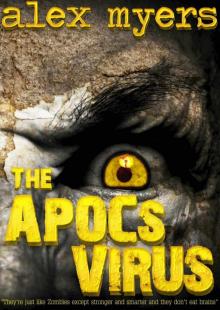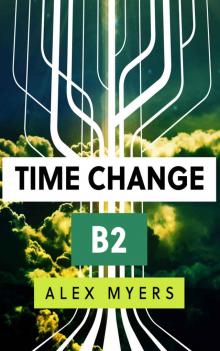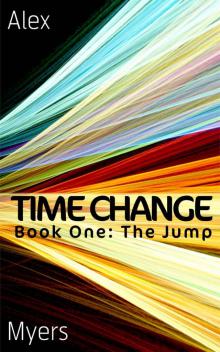- Home
- Alex Myers
Time Change B2 Page 3
Time Change B2 Read online
Page 3
It felt like a hand tightened a grip on his throat.
Norfolk had three public stagecoaches; the smaller, horse-drawn cabs competed with the larger express wagons for room on the busy, crowded streets. This night, the city was swarming with people. They rode in silence.
There were several lights on at the Sanger Mansion; they still retained most of the staff they had, as when the family was still there. Jack paid the driver and waved him away. “I can get it from here,” he said.
Jack took off his hat and slammed it onto the table near the door. “So what are these differences?”
“For one thing,” Frances said, speaking quietly but sternly as she moved his hat and sat on the couch, “your mom committed suicide and you were raised by your grandparents. You said your father pretty much abandoned you.”
“And your point is…?”
“My parents have been together for over forty years and will probably be together until they die.”
“I don’t see what that has to do with anything. You can’t blame me for something I had no control over.” He thought for a moment. “Are you trying to insinuate that because my mom and dad didn’t stay together that I can’t make a relationship work? Hell, you’re the one that came from the fairytale family and you’ve been divorced—I’ve never even been married!”
“See, that is what I am talking about.” She spat out the words contemptuously.
“I’m sorry, but I’m not following you.”
“Because I have been married and divorced, I have already made that mistake, and know how terrible it is.”
“Marriage in general? To your ex-husband, or to me? Wait a minute, marriage? That’s the second time you’ve brought that up tonight. We’ve barely even kissed, don’t get the cart too far in front of the horse.”
“Don’t sit there, lie to me, and tell me that the thought hasn’t crossed your mind.”
He was numb with increasing rage and shock. He would start to say something, think better of it, and then stop. Finally, in a calmer voice, he said, “Yes, there are differences. Some of these differences create a balance, some we have to compromise, and after seeing which works best, we can change. Change is not always bad. I would like to think I’ve adapted and changed to your century quite well.”
She looked indifferent to his argument. “I disagree with everything you are saying.”
“Frances, it almost sounds as if you’ve compiled a list of reasons to justify us being apart.”
“I have.” Her voice was absolutely emotionless and it chilled his soul. He didn’t even recognize this woman.
“It isn’t about any of this at all, is it?”
“What do you mean by that?” She asked.
“You haven’t mentioned the big difference here yet, have you?”
“It’s your story. I don’t have any idea what you’re talking about.”
“It’s the time thing, isn’t it? It’s because I’m from the future—right?”
“It might be, but not for the reason you’re thinking.”
“What are you thinking?”
“When you were in the accident on the river—I almost lost you, and then again at the attack on the church. I realized how truly vulnerable I was. I was surprised how deeply I cared for you and how easily that could be ripped away. What would happen if we were married? What if we had children? What if one day something like that happened to you again? You seem like a bad horse to bet on.”
“There are no guarantees in this life for anyone.”
“I just can’t do it!”
Getting up, she burst into tears and ran through the living room to her parents’ bedroom. Once inside, she slammed the door. Jack could hear the lock turn and sobs from the other side.
“Please open the door,” Jack pleaded as he rattled the handle.
“Just go away!” she screamed.
He slumped to the floor and they both sat with their backs to the door… with only the door and a million miles between them.
In a patient, calm voice, Jack said, “You deserve to be happy. Maybe that’s why you love me, because I love you for the person you are inside. Hopefully you can see it in my eyes whenever I look at you.”
She cried even harder, and between the tears she said, “Who said anything about love?”
“I did,” he said resolutely. “I finally said it, but I’ve thought it nearly since the day I met you.”
Rising to his feet he said, “Goodbye.” Jack got up and quietly let himself out of the house.
Jack was going to walk back home, then remembered his boat and that he was supposed to meet Sam back there. Plus, it was a closer walk to the boat, and he was feeling a little funky.
The more he walked, the worse he felt. This was the first time he had been on his feet in weeks; he was weak and nauseous.
At the Holt Street Bridge, he saw the taxi he had used to take Frances home. He called out to the driver, “Can I get a ride?”
“I’m off duty, Mac. Hey aren’t you that Jack guy I gave a ride to earlier tonight?”
“Yeah, I’m not feeling too hot. Can you give me a ride to the docks?”
“Sure thing. From all the goddamn grief you were catching tonight, you need a break.” The man hopped down and helped Jack onto the driver’s seat.
“The name is Aurellis Vitale.” He shoved an open hand in Jack’s direction.
“Jack Riggs, I hope you don’t mind if I lean over here against the side.”
“Not at all. Say, are you that inventor fellow that’s building that big place out by the Lynnhaven Inlet?”
“Lynnhaven Inlet? No, we’re right here by Broad Creek.”
“That’s right, that must be that other guy.”
“Other guy?” Jack sat up a little. “Another inventor?”
“He’s from Chicago, or worked in Chicago? I’m not really sure, I think he works for that group in Williamsburg?”
“The SAC?” Jack said. He felt so horrible that every bump in the road nearly made him throw up.
“I’m not sure. Hey are you going to be alright?”
“I’m not sure either. How much further to the dock at Widewater and Roanoke Streets?”
“Hold on Jack, we’re almost there.”
Aurellis helped Jack below deck and into one of the bunks. He was in a feverish sweat.
“Are you sure you’re going to be all right?”
“Yes, I have my friend Sam, who should be here any minute. What time is it?”
“It’s probably around eleven o’clock. Do you want me to light a lamp?”
“No, I have electric lights that run on a battery, just turn that switch on the wall by the gangway.”
“I forgot you’re a fancy inventor.”
The LED was still lit when Murphy stood over Jack’s bed. “Are you okay, Jacky?”
Jack pulled himself up from the sleep of the dead. “Murphy, what are you doing here? What time is it? Where’s Samuel?”
“I’m here looking for you. Tisn’t anyone back at the complex. I was starting to get concerned.”
Jack sat up in his bunk. He felt whole again.
“It’s nine o’clock,” Murphy said.
Jack glanced out the window: it was dusk. He stood too quickly and had to sit back down. “It’s nine o’clock at night? Friday night?”
“Sure enough is. First Kazmer, then you and Sam.”
“I’ve been sleeping for nearly twenty-four hours.” Jack had slept in his clothes. He felt the front of his trousers. “How could I do that without pissing my pants?”
“Well, I guess the world is just full of mysteries.”
Jack ate like a starving animal and Murphy sat and watched. “You sure I can’t order you something?” Jack asked. “A Schnitzel?”
“I ate an early dinner. You’re eating enough for the two of us, I think your belly and backbone are bumpin’.”
“You know how sometimes I say things you don’t understand, that works both ways,” Jack said
and smiled between bites.
“Where do you think Kazmer got up and gone to?”
“I’m sure Kaz has been kidnapped. I just can’t seeing him leaving Robbie. He seemed happy, didn’t he?”
“Other than pining away for that Turner woman, I’d bet he was as happy as a boardinghouse pup,” Murphy said.
“That’s the way I saw it too, and now Sam—I know Sam was happy, all his stuff was still there, right?”
“I didn’t go in his house, but all those damn cats of his liked to attack me when I went over to his house to check on him. Had to let three out of his house and gave them all about a leg of lamb.”
“Lamb?” Jack asked.
“All hellfire, I don’t know what cats eat, and it stopped their confounded meowing.”
“See, something happened. He loved those cats. I think the same people are responsible for them both. I think it’s the SAC.”
“The Fire-eaters?” Murphy said.
“What does the SAC have to do with the Fire-eaters?”
“That’s who the Southerners Against Compromise is, the Fire-eaters, I served in Congress with most of them.”
“It’s more than Winston Creed and Abner Adkins?” Jack said.
“Don’t know Adkins, but Creed was just one of about seven or eight of those that called themselves the Fire-eaters. Senator Brinkley was one of ‘em.”
“Was?”
“There was some sort of falling out a while back, bout the same time they took a violent turn.”
“I’m going to head up the James River. I’m going to get my friends back.”
“When it gets down to nut-cutting, you can count me in.”
“What does that mean?” Jack asked.
“I’m coming too.”
CHAPTER 4
Saturday, June 27, 1857
Jack still wasn’t feeling one hundred percent, and without Sam’s help, he didn’t trust himself sailing the big boat alone, so he and Murphy took the stagecoach. They learned from the driver that the SAC plant was three miles from Williamsburg near the James River and Jamestown.
They stayed on the coach through Williamsburg. Jack was astonished how similar it looked to the town he went to school in 150 years later. The stagecoach station in Jamestown was near the river.
“I reckon that’s the SAC plant, that big facility over yonder. You can practically chuck a rock here to there,” Murphy said.
“Let’s go see what we’re up against.”
“Know thy enemy, right, Jack?”
This was too weird. That was the second time he had been quoted from the ‘Art of War’ in a week. “Where did you learn that quote?” Jack asked.
“You told me.” Murphy looked at Jack as if Jack had lost his mind.
“Oh, then by all means, as long as we are here.”
They stood in front of the SAC Manufacturing Plant on the riverfront. The James River, on the other side, was completely obscured from view.
“Wow, I didn’t think it would be this big, I don’t remember all this,” Jack said. The SAC Plant sprawled for three-quarters of a mile in all directions.
“You’ve been here before?”
Jack didn’t want to tell Murphy that the last time was 2005. “Yes, but it’s been a while.”
The factory, dark and foreboding, had a blast furnace bellowing great belches of smoke into the midday sky. Tangles of pipes, clouds of steam, catwalks of steel looked like ribs on a giant brick and metal monster. It smoked; it rumbled with a saw-tooth snore, it rained down black soot from the six-bricked smokestacks. Workers swarmed around its docks and armed guards stood in out of place in what looked like newly built turrets around the perimeter.
“Good Gravy! That place is big as all hell and half of Texas. What do you reckon they make in there?”
“Close as I can tell, a little bit of everything. Basically whatever they can steal. I think this place, or at least part of it, is fairly new.” Jack was fairly sure that this place wasn’t here, at least in his version of history. Jack already knew the research facility in Virginia Beach that Murphy told him about was new to this ripple in time.
They walked around the far end of the building, opposite the entrance, and climbed a small hill. “What do you know about this part?” Jack asked.
“It’s my first time here too,” Murphy said.
Shielded on three sides by the hilly ridge, and the fourth side by the factory itself, was a two-story building a hundred yards long and twenty yards wide. There were small porthole-sized, deeply inset, rectangular windows about every ten feet. Heavy block style rustication and lack of bigger windows or doorway made the building seem like an impenetrable fortress.
“Wow, get down Murph!” Jack said as he ducked behind some scree from the hillside. Jack pointed to the two guards with rifles on the roof of the building. Two other armed guards were at a fenced gate area between the two buildings.
“Are they keeping people out or keeping them in?”
“Does it matter? Wait, look.” Jack pointed to the windows. Most of the windows were filled with faces, and they all seemed to be staring at them.
“Those men look dead, ‘ceptin someone forgot to tell them.”
“I’ve got a bad feeling about this place. Come on, let’s go see what we can find out.”
They walked toward the armed men guarding the gate. Jack saw another turret with guards and another man with a rifle on top of the building by the hill. What is going on with this place? As soon as the guards saw them they raised their weapons. Jack and Murphy raised their hands to show they were unarmed.
“What do you want?” a guard screamed.
“I’ve come here to see Winston Creed.”
“No can do.”
“How about Abner Adkins?”
“Can’t see him either.”
“I’ve got business with them.”
“They are not here. They are at the place at the beach.”
“Virginia Beach?”
“Yeah.” The guard looked like he answered too fast and wanted to take it back.
“Lynnhaven Inlet?”
“Who did you say you were again?”
“I didn’t.”
The second guard, who had been quiet, pointed and with great urgency said something to the first guard.
“I think you and you grandpa need to get out of here now.”
Behind Jack and Murphy, a half mile back up the road from Williamsburg, a dark covered wagon was heading toward the plant. The two guards looked extremely agitated. He raised his rifle again and pointed it at Jack’s head. “I said get the hell out of here now!”
The second guard fired a shot into the air over Jack and Murphy’s heads.
“Okay, we’re leaving,” Jack said. He grabbed Murphy’s arm and pulled him down the road to Jamestown. After they were fifty feet away, Jack said to Murphy, “I think there’s something in that wagon they don’t want us to see.”
They slowed their walk down and kept glancing back over their shoulders. The first guard still had his gun aimed in their direction as the other guard moved to open the gate for the approaching wagon. The wagon stopped in front of the gate and both guards moved quickly to get the wagon into the enclosed area as quickly as possible. Jack and Murphy stopped and turned around and stared at the unusual wagon. It was eight foot long, four feet wide and four feet high, painted black, pulled by two horses, and had bars on the windows. A ragged man with stringy hair and beard raged inside the enclosure, the lone driver looked bored with the process.
“What the hell?” Jack said mostly under his breath.
“I think that’s the loony wagon.” Murphy said.
“I don’t think we were supposed to see that.” They walked a little further along. “How well do you know Senator Brinkley?”
“Stephen? Served four years together in the Senate, served on a committee together. I know and like him, consider him a friend.”
“Can you talk to him, see what you can find ou
t about this place? My gut is screaming something bad is going on here.”
“I know that the Fire-eaters nearly lost the election for him and right now he’s blaming them for what happened to his wife.”
“Mattie Turner?” Jack asked.
“Or whatever the hell her name is.”
“I know it’s bad, but see if you can’t stoke that fire a little.”
“There’s only one problem. Senator Brinkley is at the State House, back up in Richmond. I’ll head up there on the next coach.”
“From here in Jamestown?”
“Aim to. I see a couple of coaches there now. ”
They had two coaches heading to Richmond over the next couple of hours, but none heading toward Norfolk. There was a coach leaving Williamsburg in three hours for Norfolk.
“I’ll walk there, I’m fine,” Jack said.
“If you think you’re well enough.”
“No problem. Contact me at the complex, we have a telegraph line in there now. Get in touch with any kind of word or if you need me.”
“Alrighty. In Richmond I’ll be at the Capitol Hotel; when I get back here to Williamsburg, I’ll be staying at the College Inn.”
“Jesus Christ, Murph, for a guy that lived in a hovel, you sure know a lot about hotels.”
“What’s that one sayin’ of yours about your balls?”
“Busting my balls?”
“Yep, that’d be the one. Quit busting mine. See ya, Jack.”
“Fine, I’m heading to Virginia Beach.”
CHAPTER 5
Saturday, June 27, 1857
To make it to Norfolk that night, Jack needed to walk to Williamsburg to do it. Jack was no stranger to the town, having attended William and Mary College in the mid 90s. When he was there for college, Colonial Williamsburg had over five hundred original and reconstructed public buildings, private homes, taverns, and shops, as well ninety acres of gardens and village greens. Characters roamed the city streets dressed in authentic era costumes and would explain life the way it used to be in eighteenth century America. You could see glass blowers, blacksmiths, and cooks plying their trades. Other than the presence of automobiles, the downtown streets Jack now walked were very similar to the streets he walked a hundred and fifty years later. He thought it didn’t look quite so touristy, and where the 2013 colonial style Burger King should have been, now stood a building that sold slaves.

 The Story of Silence
The Story of Silence The APOCs Virus
The APOCs Virus The Time Change Trilogy-Complete Collection
The Time Change Trilogy-Complete Collection Time Change B2
Time Change B2 Time Change Book One: The Jump
Time Change Book One: The Jump